Wake Forest University Awarded $30M Lilly Endowment Inc. Grant to Build National Capacity for Character Education
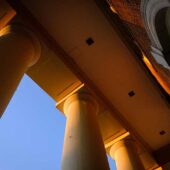 The Lilly Endowment Inc. has awarded Wake Forest a $30.7 million grant to support the University’s Program for Leadership and Character and create a national higher education network devoted to educating character.
The Lilly Endowment Inc. has awarded Wake Forest a $30.7 million grant to support the University’s Program for Leadership and Character and create a national higher education network devoted to educating character.
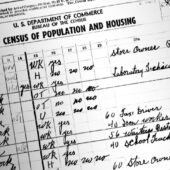 When Wake Forest sophomore Gabi Overcast-Hawks searched the 1950 U.S. Census records, she found her grandfather’s handwritten name, along with his mother and father and seven brothers and sisters. Place of birth: Carroll County, Virginia. Occupation: farmer. She and the other students in Professor of Sociology Ana-Maria Gonzalez Wahl’s “Sociology of Work, Conflict and Change” class, used the demographic snapshots of people in their own family trees to better understand bigger picture societal trends.
When Wake Forest sophomore Gabi Overcast-Hawks searched the 1950 U.S. Census records, she found her grandfather’s handwritten name, along with his mother and father and seven brothers and sisters. Place of birth: Carroll County, Virginia. Occupation: farmer. She and the other students in Professor of Sociology Ana-Maria Gonzalez Wahl’s “Sociology of Work, Conflict and Change” class, used the demographic snapshots of people in their own family trees to better understand bigger picture societal trends.
 Thanks to John and Libby Reece, the Wake Forest Student Union Collection of Contemporary Art is getting a new name and, with a generous gift, a lot of love as well.
Thanks to John and Libby Reece, the Wake Forest Student Union Collection of Contemporary Art is getting a new name and, with a generous gift, a lot of love as well.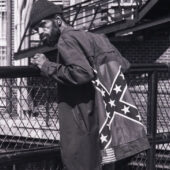 “Representation Matters: Art, Space and Racial Restitution,” a webinar co-sponsored by Hanes Gallery, Wake Forest University’s Slavery, Race and Memory Project and Wake the Arts, will be held Wednesday, Sept. 30 from 6 to 7:30 p.m. The panel will be moderated by humanities professor Corey D. B. Walker and feature conversations around the works. The event is free and open to the public. Registration is required.
“Representation Matters: Art, Space and Racial Restitution,” a webinar co-sponsored by Hanes Gallery, Wake Forest University’s Slavery, Race and Memory Project and Wake the Arts, will be held Wednesday, Sept. 30 from 6 to 7:30 p.m. The panel will be moderated by humanities professor Corey D. B. Walker and feature conversations around the works. The event is free and open to the public. Registration is required.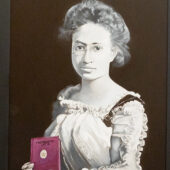 The course “Classics Beyond Whiteness” was originally limited to 15 students. Twenty-six registered. “I couldn’t turn students away,” said classics professor T.H.M. Gellar-Goad. The fall class was one of several planned courses, events and programming focusing on “Classics Beyond Whiteness” - a multidisciplinary collaboration that examines a misleading and damaging tendency to focus on white scholars and perspectives in claissical studies while excluding black voices.
The course “Classics Beyond Whiteness” was originally limited to 15 students. Twenty-six registered. “I couldn’t turn students away,” said classics professor T.H.M. Gellar-Goad. The fall class was one of several planned courses, events and programming focusing on “Classics Beyond Whiteness” - a multidisciplinary collaboration that examines a misleading and damaging tendency to focus on white scholars and perspectives in claissical studies while excluding black voices.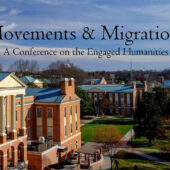 On October 18-19, Wake Forest will host Movements and Migrations: A Conference on the Engaged Humanities. The event is sponsored by the Andrew W. Mellon Foundation.
On October 18-19, Wake Forest will host Movements and Migrations: A Conference on the Engaged Humanities. The event is sponsored by the Andrew W. Mellon Foundation.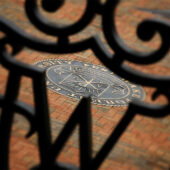 The Andrew W. Mellon Foundation has awarded Wake Forest University an $850,000 grant to expand its community-based partnerships through engaged teaching and research in the humanities. The four-year grant will support “The Humanities Engaged: Generating Learning, Remaking Community” through June 2022.
The Andrew W. Mellon Foundation has awarded Wake Forest University an $850,000 grant to expand its community-based partnerships through engaged teaching and research in the humanities. The four-year grant will support “The Humanities Engaged: Generating Learning, Remaking Community” through June 2022. A $650,000 grant from The Andrew W. Mellon Foundation has been awarded to Wake Forest University in support of “engaged humanities."
A $650,000 grant from The Andrew W. Mellon Foundation has been awarded to Wake Forest University in support of “engaged humanities."  Severe drought, rising seas and dangerous storms — activist Mary Robinson says the world must act in solidarity for climate justice. No country alone can protect its citizens.
Severe drought, rising seas and dangerous storms — activist Mary Robinson says the world must act in solidarity for climate justice. No country alone can protect its citizens. Not every college president has written a book that is required reading for students across the country a quarter century after its publication like President Nathan Hatch’s “The Democratization of American Christianity.”
Not every college president has written a book that is required reading for students across the country a quarter century after its publication like President Nathan Hatch’s “The Democratization of American Christianity.”